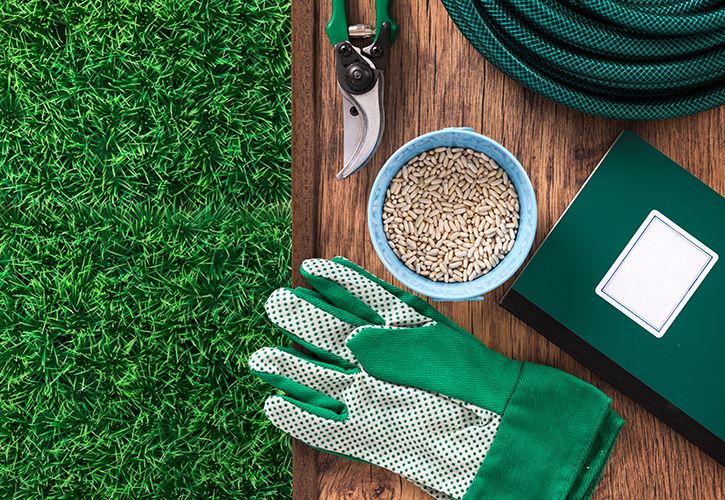UK DIY News
Aviva Encourages Homeowners To Create Flood-Resilient Gardens

- Only a third (33%) believe lack of natural planting can increase flood risk and just three in ten (28%) think artificial grass poses a risk1
- Yet support for landscape rewilding and nature-based solutions is high
- Aviva and Wildlife Trusts have developed British Rainforest Garden at RHS Chelsea Flower Show 2025
- Aviva encourages homeowners to ensure their homes and gardens are climate-ready
As this year’s RHS Chelsea Flower Show 2025 begins, leading insurer, Aviva, is encouraging homeowners to consider flood resilient materials in their gardens, to ensure their homes are climate-ready for the future impacts of extreme weather.
Research commissioned by the insurer, among 2,000 consumers, found that many are unaware of the risks posed by some popular garden changes, including artificial grass or a lack of planting. Just three in ten (28%)1 believe artificial grass may increase flood risk, with almost half (47%) believing it has no impact. Similarly, while a third (33%) think a lack of natural planting in the garden may increase the risk of a flood, 44% believe it has no impact.
A previous study by the insurer in 20232 revealed that a fifth (21%) of UK residents had already replaced or planned to switch their natural lawn with artificial grass. In reality, a lack of permeable materials and planting in a garden can make it more difficult for water to be absorbed, especially during dry weather.
These changes can increase the risk of flash flooding when heavy and intense downpours fall onto dry ground particularly following hot, dry weather. The risk can increase in urban areas where impermeable surfaces can prevent water from soaking into the ground, with more water going into drainage systems, potentially overwhelming them and causing floods.
The risk of flash or surface water flooding can increase further during the summer months. Aviva data3 shows that July and August experience almost a quarter (24%) of all flood claims received, with each month receiving 12% of annual flood claims, second only to December (17%).
Urban areas can be most at risk because a lack of green space can leave rainwater with nowhere to go when the drains are overwhelmed. The impacts of flash floods shouldn’t be underestimated.
“Urban areas can be most at risk because a lack of green space can leave rainwater with nowhere to go when the drains are overwhelmed. The impacts of flash floods shouldn’t be underestimated. Even a few centimetres of rainwater can have a devastating impact on homes, taking weeks or months to dry out, or damaging treasured family belongings.
“And while they may seem like a low-maintenance option, artificial lawns can also cause problems. Most are made from plastic with a limited lifespan, so they will eventually end up in landfill. We’d urge homeowners to consider more flood resilient alternatives, including using permeable materials, such as gravel, installing drains or planting borders to allow rainwater to reach the ground.”
The research1 shows that, despite the popularity of some garden changes, landscape restoration and nature-based solutions are recognised as effective flood mitigation methods. Four fifths of people (82%) agree that landscape restoration provides flood mitigation benefits while almost three quarters (75%) believe nature-based solutions can help reduce flood risk. Additionally, three quarters (74%) of residents are supportive of more investment in nature-based solutions to help reduce flooding.
Creating a piece of rainforest habitat at home
At this year’s RHS Chelsea Flower Show, Aviva and the Wildlife Trusts have designed a show garden inspired by their temperate rainforest partnership. The garden includes plants which can help mitigate flood risk and improve biodiversity. These benefits can be replicated in small gardens or outside spaces.
Storah added: “The British Rainforest Garden at this year’s RHS Chelsea Flower Show helps support the restoration of threatened habitats and demonstrates how gardens can provide multiple benefits. Importantly, these benefits can be brought to the smallest of outside spaces, to help ensure gardens are climate-ready and resilient to future weather impacts.”
To help homeowners ensure their gardens are more resilient, Aviva has developed the following guidance for planting and outside spaces:
- Use the right plants in the right place. Avoid planting trees or shrubs too close to your house and keep an eye on growth.
- Choose more permeable materials for hard surfaces, such as gravel or block paving.
- Consider making partial changes – having a border or installing a drain can help rainwater to run off during heavy downpours.
- Consider rewilding an area of your outside space – even the smallest border or more natural planting can help attract wildlife and encourage water to drain away.
- Collect rainwater – to help prevent water from overwhelming drains.
The following plants have been planted in the British Rainforest Garden at RHS Chelsea Flower Show 2025:
- Silver birch: supports up to 300 insect species. Plant between November and March. For smaller gardens, consider a crab apple.
- Cypress-leaved plait-moss: prefers free-draining soil and shady, wet spots.
- Maidenhair spleenwort: a native fern that works well with flowers in the border.
- Cow parsley: thrives in partial shade.
- Foxglove: adds colour and helps attract bees.
The Wildlife Trusts British Rainforest Garden, designed by award-winning Zoe Claymore, is sponsored by Project Giving Back and supported by Aviva, and is inspired by the insurer’s partnership with The Wildlife Trusts to help restore rainforests in the UK. Visitors are invited to see the garden at site number 340 throughout RHS Chelsea Flower Show from Tuesday 20th May to the final day on Saturday 24th of May 2025.
Following the Show, the garden will be relocated to the Bristol Zoo Project.
1 Research conducted by Censuswide on behalf of Aviva among 2022 UK homeowners August 2024. [↑]
2 Research conducted by Censuswide on behalf of Aviva among 2004 UK homeowners August 2023. [↑]
3 Analysis of Aviva commercial and personal property flood claims data 2013-2024 (June 2024). [↑]
4 UK weather: Spring may become driest on record - BBC Weather [↑]
Source : Aviva
Image : Stock-Asso / shutterstock.com / 276802847
Insight DIY is the only source of market information that I need and they always have the latest news before anyone else.











































